
Swiss parliamentary committee favours partial funding of UNRWA

A Swiss parliamentary committee has called for partially resuming support for the United Nations Relief and Works Agency for Palestine Refugees in the Near East (UNRWA) – but has imposed conditions.
The House of Representatives’ Foreign Affairs Committee is specifically calling on the Federal Council, the executive body, to provide UNRWA with an initial instalment. However, the relief organisation must be able to guarantee that Swiss money will only be used for emergency and humanitarian aid, Committee President Laurent Wehrli told the media in Bern on Tuesday.
No decision has been made on the amount and the government is yet to weigh in. A motion to release the originally budgeted payment of CHF20 million ($21.9 million) immediately and in full was rejected by 16 votes to 8.
Switzerland is one of the UN agency’s largest donors. However, it suspended payment after Israel accused UNRWA employees of being connected to the massacre on October 7, when Hamas attacked southern Israel.
Recommendation welcomed
The head of UNRWA, Philippe Lazzarini, welcomed the committee’s recommendation and said it was important for Switzerland to continue its humanitarian tradition in the region.
“It is important for Switzerland to continue to be a partner of the most important aid agency for Palestinian refugees, at a time when they need support the most,” Lazzarini said at a press conference on Tuesday.
When asked about the Committee’s intention not to commit to funding UNRWA directly in the long term, Lazzarini said he hoped this would not happen “before Switzerland and the other member states [have] worked towards the creation of a Palestinian state”, i.e. before the agency could withdraw from the region.
Until then, “any weakening of the agency will be seen by the Palestinians as a blow to their aspirations for self-determination”, he warned.
Adapted from German and French by DeepL/kp/ac
This news story has been written and carefully fact-checked by an external editorial team. At SWI swissinfo.ch we select the most relevant news for an international audience and use automatic translation tools such as DeepL to translate it into English. Providing you with automatically translated news gives us the time to write more in-depth articles.
If you want to know more about how we work, have a look here, and if you have feedback on this news story please write to english@swissinfo.ch.

In compliance with the JTI standards
More: SWI swissinfo.ch certified by the Journalism Trust Initiative

























You can find an overview of ongoing debates with our journalists here . Please join us!
If you want to start a conversation about a topic raised in this article or want to report factual errors, email us at english@swissinfo.ch.